In this article:
Many different types of sleep disorders can make it difficult to get enough quality nighttime sleep regularly such that you wake up feeling tired and drowsy the next day. (1)
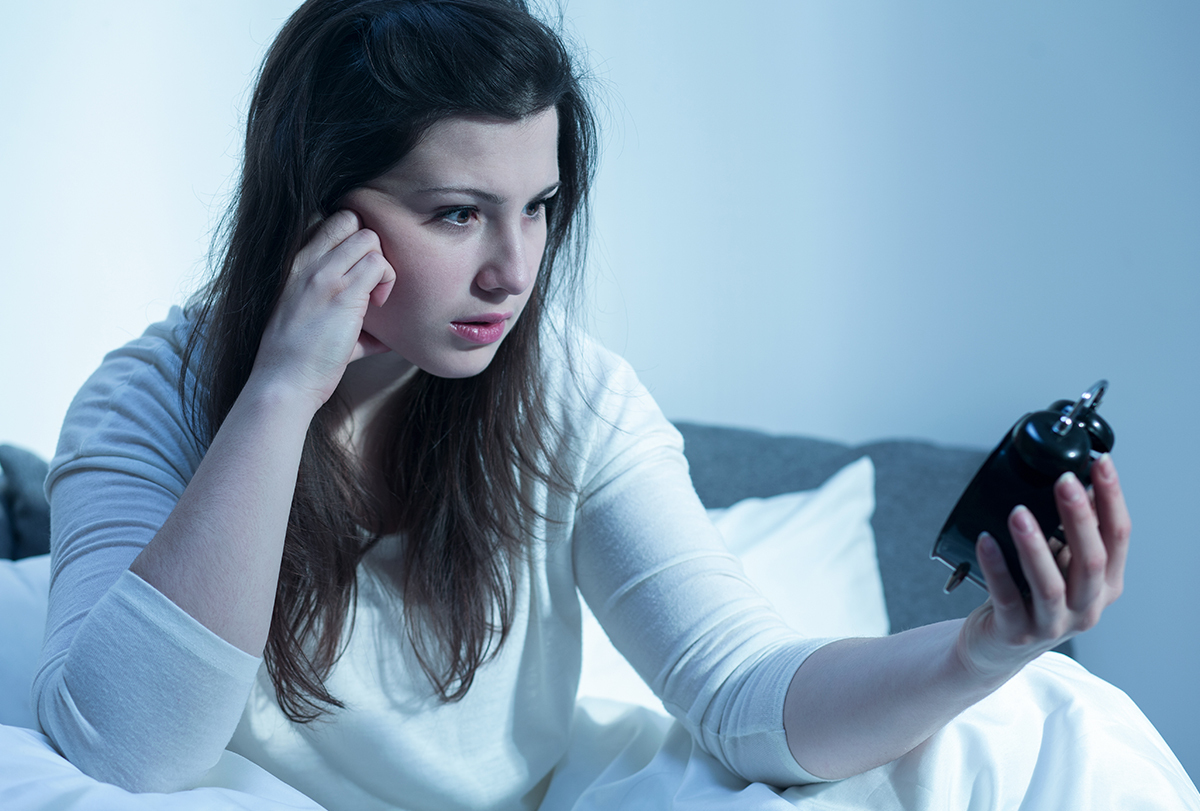
In this day and age of high stress, distressing news cycles, demanding jobs, limited time for needed activities, and poor nutrition, most Americans suffer from poor sleep quality. Sleep quality is one of the main drivers of optimal health, and poor sleep quality and/or quantity can lead to poor health outcomes. (2)
According to many authors, sleep deprivation is rampant these days and many people don’t even know they even suffer from sleep deprivation. According to SleepFoundation.org, sleep deprivation is defined as not getting the needed amount of sleep, which, for adults, is 7–9 hours.
Lack of sleep can hamper your ability to focus and stay alert throughout the day and can damage your health in a variety of ways, paving the way for various poor health outcomes.
Studies have shown that even losing only 90 minutes’ worth of nocturnal sleep can reduce your alertness the next day by as much as one-third. (3)
Major Reasons for Not Sleeping Properly at Night
Here are some common factors responsible for poor-quality sleep or sleep deprivation:
1. Stress
Increased stress is a well-known sleep disruptor. (4) But different people have different thresholds in this regard.
This could be better understood through the concept of sleep reactivity, which refers to the degree of stress that usually makes one lose sleep. This could vary from person to person.
Unfortunately, some are more prone to have higher sleep reactivity, and those same people may experience a drastic reduction in sleep quality and quantity when experiencing an increased amount of stress.
Sleep reactivity is influenced by genetics, family history of insomnia, female gender, and environmental factors. (5) The good news is that sleep reactivity can be modulated with cognitive behavioral therapy, mindfulness, meditation, and even exercise.
2. Use of electronics during bedtime
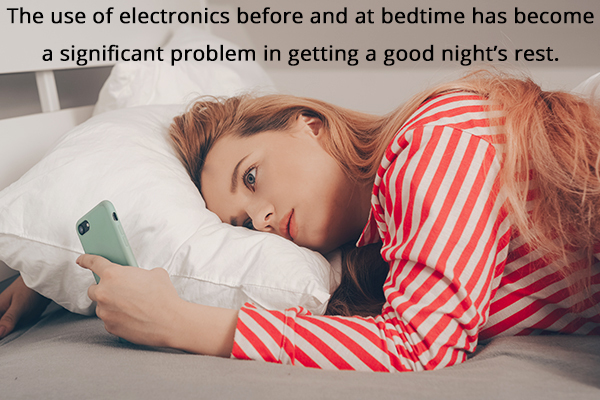
The use of electronics before and at bedtime has become a significant problem in getting a good night’s rest.
It has been shown (and scientifically proven) that electronic devices such as TVs, cell phones, and computers keep the mind stimulated before sleep, thus disrupting the normal pattern of relaxation before sleep. (6)
Also, the blue light emitted by these devices disrupts the circadian rhythm, leading to increased difficulty in sleep-wake cycle moderation.
3. Smoking
Previously, it was difficult to pinpoint sleep disturbances to smoking. But the research is in, and it clearly links smoking with poor sleep hygiene.
Many studies have shown a clear association between smoking and poor sleep. Smoking has been linked with difficulty initiating sleep and sleep fragmentation. (7)
These links are thought to be multifactorial and include the stimulating effects of nicotine, the nightly withdrawals experienced by smokers, and possibly the promotion of snoring and sleep apnea by smoking.
4. Not exercising enough
A lack of exercise is undoubtedly bad for sleep. A 2017 review paper by Kelley and Kelly in the Journal of Evidence-Based Medicine stated that exercise can play a beneficiary role in addressing selected sleep-related problems in adults. (8)
The sleep parameters studied in this review were apnea-hypopnea index (AHI), overall sleep quality, global score, subjective sleep, and sleep latency.
The physiology and psychological pathways linking exercise and high-quality sleep are still not completely understood, but multiple studies corroborate improved sleep parameters with increased exercise.
Some of the potential mechanisms include (1) a reduction in anxiety, (2) better vascular health, and (3) improved capabilities to easily fall into REM sleep.
5. Excessive alcohol intake
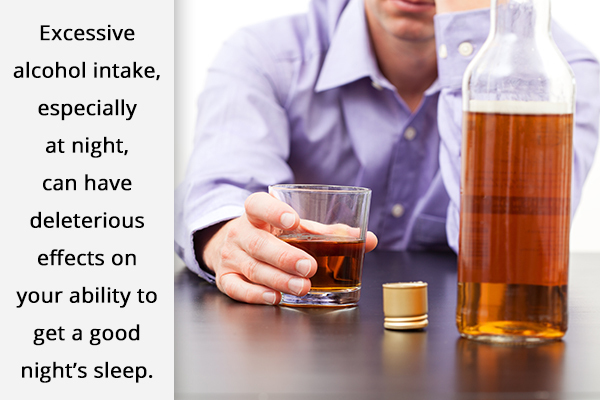
Excessive alcohol intake, especially at night, can have deleterious effects on your ability to get a good night’s sleep. Alcohol has been studied widely, and it is well known to “reduce sleep onset latency and increase wakefulness later in the night.”
According to a 2020 review article by Koob and Colrain about alcohol use disorder and sleep disturbances in the journal Neuropsychopharmacology, the above sleep disturbances “may be related to the acute effects of alcohol on GABAergic systems that are associated with sleep regulation and the effects on brain incentive salience systems, such as dopamine.” (9)
6. Late-night coffee
Everyone knows that coffee is a stimulant. Besides being the world’s most abused drug, caffeine is also one of the top contributors to the world’s most under-reported medical problems affecting almost 30% of the population. It is estimated that 90% of American adults consume caffeine-infused drinks daily.
Innumerable studies have pointed to caffeine as a major disruptor of sleep via multiple pathways. (3) Caffeine has a half-life of up to 17 hours, which can lead to poor sleep quality even if used early in the day. (10)
Although not everyone is affected by caffeine in the same way, caffeine can reduce sleep onset, sleep efficiency, and total sleep time. Again, given the wide genetic variances in humans, caffeine will not affect everyone the same.
7. Bedroom light and temperature
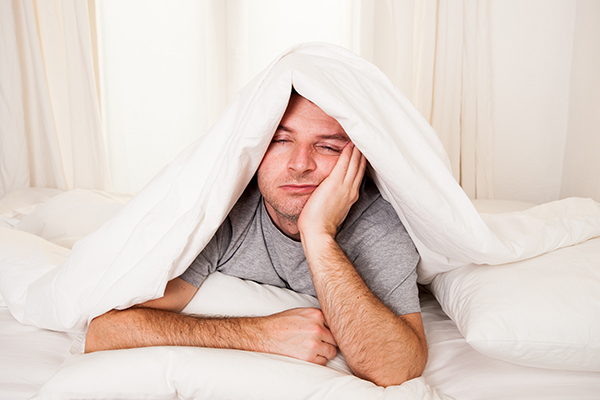
Light exposure plays a significant role in sleep quality, onset, and total sleep time. (11) Sleep is regulated by a circadian rhythm, and many external forces can affect these inner circadian rhythms, but the most dominant is light. In fact, it is routinely used to adjust one’s sleep-wake cycle in order to manage jetlag, shift work, and sleep disorder. (12)
As mentioned above, blue light emitted from electronic devices is detrimental to good sleep as it inhibits the correct circadian rhythms needed for proper sleep-wake cycles.
One of the best ways to improve your circadian rhythms to bolster quality sleep is to avoid blue light 1–2 hours before bed and to get direct sunlight exposure first thing in the morning when you wake up – ideally within the first hour of waking up.
Besides disturbing good sleep at night, blue light, when seen in the morning, can decrease melatonin and increase cortisol – this combination is ideal for improved sleep-wake cycles, and it just so happens that the sun is the best source of blue light.
Another good reason for sunlight exposure in the morning is that natural sunlight helps your body increase its production of a neurotransmitter called serotonin, which affects multiple aspects of your body’s health and functioning, including mood and sleep.
Serotonin is a precursor for melatonin, and in the evening, serotonin is then converted back to melatonin, helping improve your sleep. (13)
Temperature also plays a role in quality sleep. When you go into deep sleep, the body tends to cool down below its normal core temperature. Ideally, the optimal sleeping temperature falls between 60 and 67°F.
It is imperative to put your body into a cooler environment because this helps stimulate sleep and allows you to cycle naturally through all the sleep stages, required for a good night’s sleep. A cooler sleep environment helps you fall asleep quicker and increase melatonin production.
8. Pets in the bedroom
People often report to me during their office visit that their sleep is interrupted by pets in the room. My first response and recommendation are to not sleep with pets in the room.
Pets such as cats and dogs often make noises in the night and disrupt deep sleep, resulting in poorer quality of sleep. (14) Cats will often “cuddle” up on people’s chest, head, or neck, inhibiting quality breathing and airflow, and again, this disrupts sleep quality.
It is recommended that animals sleep in separate rooms to keep sleep disruptions to a minimum.
What Are Symptoms of Sleep Deprivation?
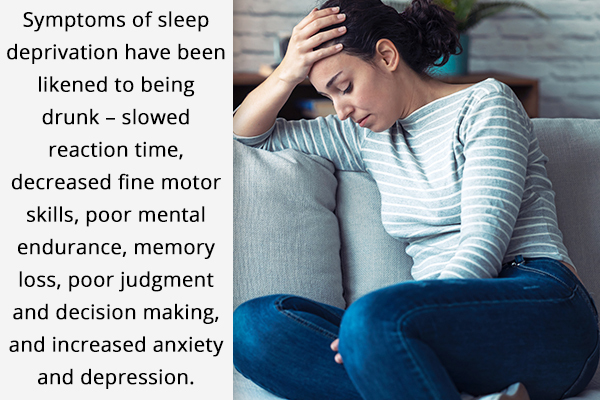
Being a board-certified MD and having gone through 5 long years of residency, I know a little about sleep deprivation and its symptoms. I once fell asleep at a stop light on my way home from a 30-hour surgical shift, only to be awakened by horns blaring at me from behind.
Symptoms of sleep deprivation have been likened to being drunk – slowed reaction time, decreased fine motor skills, poor mental endurance, memory loss, poor judgment and decision making, and increased anxiety and depression.
What Health Problems Can Stem From Inadequate Sleep?
One thing most people don’t know is that sleep deprivation can cause negative changes in their genetic expression. Poor sleep quality and quantity disrupt the lives of millions of people around the globe and can wreak havoc on their epigenome.
Epigenomics is the study of the epigenetic changes in a cell. According to the National Cancer Institute, “Epigenetic changes are changes in the way genes are switched on and off without changing the actual DNA sequence. They may be caused by age and exposure to environmental factors, such as diet, exercise, drugs, and chemicals. Epigenetic changes can affect a person’s risk of disease and may be passed from parents to their children.”
As noted from the source above, poor sleep – besides leading to heart disease, stroke, anxiety and depression, obesity and diabetes, high blood pressure, and neurocognitive diseases such as Alzheimer’s disease and Parkinson’s disease – may even lead to an increased risk of many different types of cancers.
1. Cardiovascular disease
Many studies have shown strong correlations between sleep deprivation and well-known cardiovascular diseases including increased risks of heart attack and stroke, coronary artery disease, and high blood pressure. (15)
2. Lowered immunity
Many functions of the immune system are fortified during regular sleep. T cells and B cells do much of their immune surveillance during sleeping hours, and a decrease in sufficient sleep may lead to increased risk of infections, illnesses, and even cancer. (16)
3. Hormone dysregulation and imbalances
Insufficient sleep may disrupt the normal hormonal balance the body requires to function optimally. These hormones are required to stabilize everything from blood sugar, lipids, and sex hormones to even satiety hormones involved with feeding. (17)
Many of these hormones can become unbalanced without adequate sleep, and this can lead to diabetes, obesity, sexual dysfunction, fatigue, dyslipidemia, and many more metabolic imbalances.
4. Anxiety and depression
Poor sleep quality and quantity have been strongly associated with increased anxiety and depression and other mental health disorders including bipolar disorder, schizophrenia, worsened PTSD, and even OCD.
How Much Sleep Is Needed at Different Stages of Life?
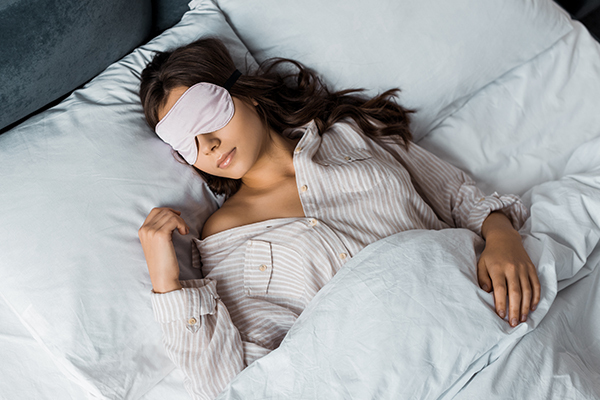
The Centers for Disease Control and Prevention (CDC) have set specific guidelines for how much sleep is required in the different stages of life. (18) The sleep requirements change with age, and the older you get, usually the less is needed.
Adults are advised to get at least 7–9 hours of sleep daily. Teens, aged 13–18, usually need 8–10 hours per night with school-aged kids needing 9–12 hours per night. Newborns and toddlers need 11–17 hours of sleep per night.
Final Word
Getting enough good-quality restful sleep regularly is very important for a healthy and vibrant life. Poor-quality sleep or sleep deprivation can make you feel irritable, low on energy, and groggy the whole day.
Plus, you need sleep to allow your body to rest and repair itself. Lack of restorative sleep will hamper your body in ways that can lead to the onset of various chronic diseases over time.
Many aspects of the metabolic requirements of sleep are still unknown, but a few things are well studied and well documented, and they include sleep’s ability to improve cognition, fight disease, improve mental health, decrease the risk of chronic disease, and improve overall quality of life.
It is important that you get the right amount of sleep for your age group. And don’t skip out on sleep one night thinking that you can make up for it – that is a myth! You can never make up for a lack of sleep, no matter how hard you try.
- Was this article helpful?
- YES, THANKS!NOT REALLY


